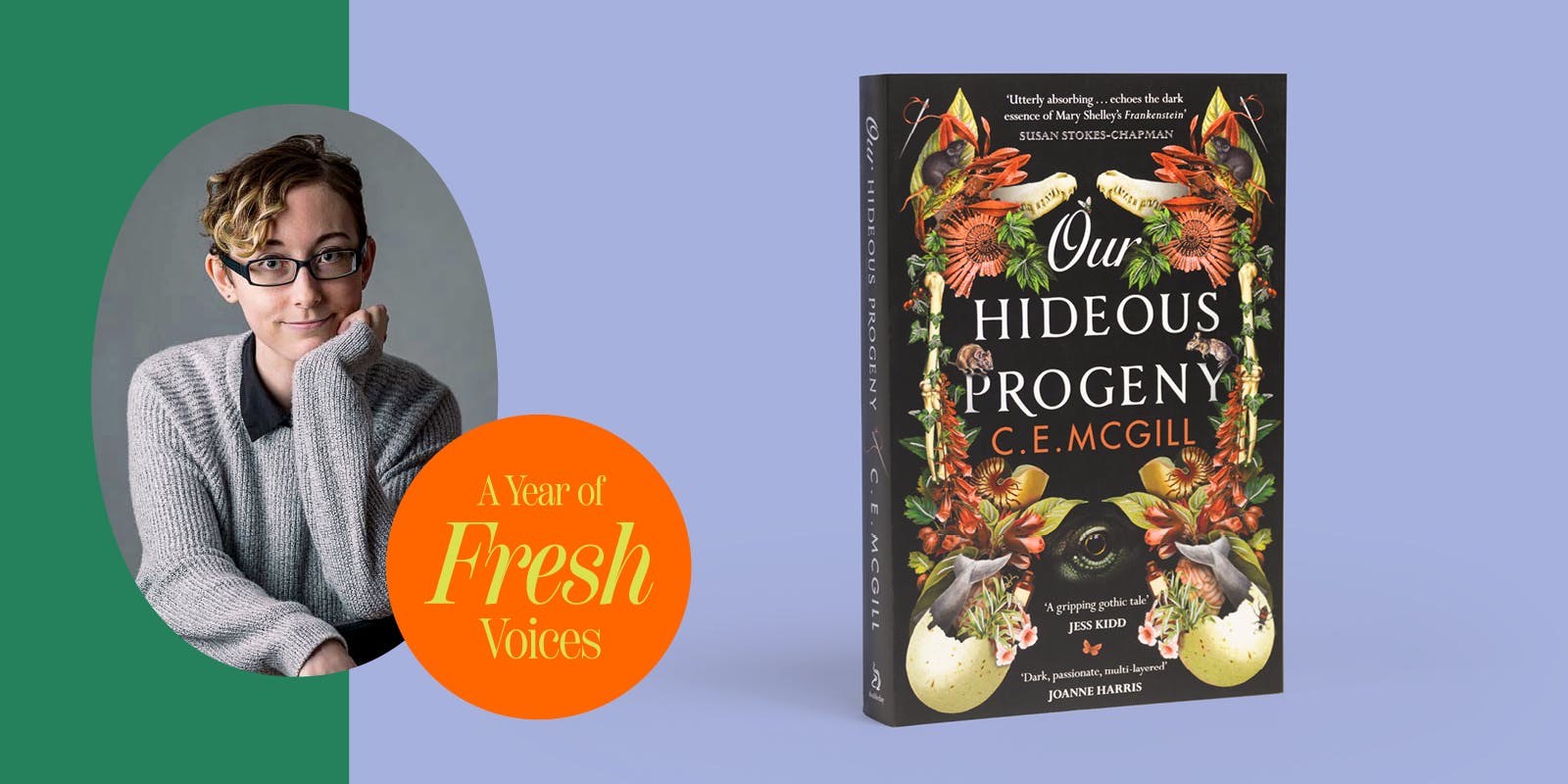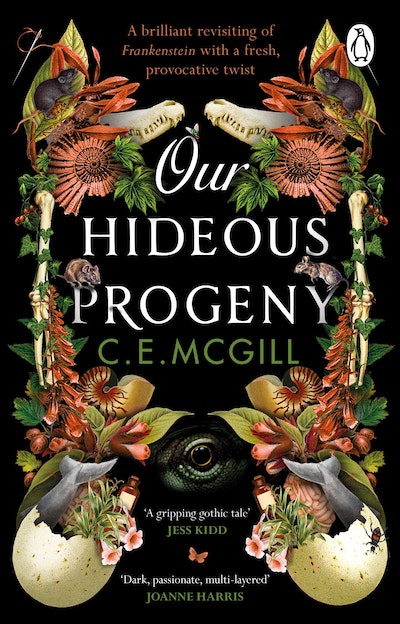Plus find out how they turned a university project into a debut novel.
What was your writing process like for Our Hideous Progeny? Did you have a writing routine or any regular rituals?
Oh, how I wish I had a routine! My writing schedule is a bit chaotic, to say the least; some days I’m really in the groove and will write for eight hours straight. On other days I hardly get anything done at all, or have more of a research/book promotion day. The first draft of this book was rather unique in that I wrote it as my final year project in university, so I knew that I had to get it done within a certain timeframe or I’d fail my course. Now, I have to set my own deadlines to convince my ADHD brain to work. One ritual I find really helpful for actually getting me to sit down and write, though, is lighting a candle – it sets up a peaceful mood, and also ties me to my desk (because if I leave the candle unattended, my cats will knock it over and burn the house down. High stakes.)
How did you first come up with the idea for the book?
I came up with the idea during my final year of university, where I majored in a rather Frankensteinian degree of my own design entitled 'Narratives of Science in Fiction and History.' This degree was a combination of creative writing, scientific history, and literary analysis, looking at how science is presented in sci-fi and popular non-fiction alike. It was fascinating, but for the longest time, I was stumped as to what to do for my final-year project. Eventually, the stars aligned: I was rereading Frankenstein for one class, while in a different class on nineteenth-century science, we were learning about Victorian paleoart. I was fascinated by how these early works (like the Crystal Palace dinosaurs) 'brought to life' long-dead creatures for the public eye – and began to wonder what would happen if some descendant of Frankenstein tried to 'bring to life' their own paleontological theories in a much more literal way.
What was your big break into publishing?
This, I hope! Our Hideous Progeny is actually the first novel I’ve ever finished, not counting the bizarre post-apocalyptic YA I wrote for NaNoWriMo when I was eleven. I’ve started and abandoned a lot of books over the years, but I never thought that I would make a career of it until a few years ago when I had a major mid-life crisis in the middle of my aerospace engineering degree. I finally decided to take a proper stab at being a writer professionally and was fortunate enough to sign with my wonderful agent, Sue, after only about six months of querying. I was fully prepared to spend the next five to ten years trying to get published, so I’m over the moon that everything came together so quickly!
How long have you been working on this book?
Hard to say, I worked on Our Hideous Progeny in fits and starts for a few years as I swapped the manuscript back and forth with my editors. I began writing it right at the beginning of 2019, and it probably took two to three years of work altogether to get it to the very final draft.
What was the publishing process like (finding an agent, submitting manuscripts, etc.)?
As I mentioned above, I was totally shocked to find myself with an offer of representation from an agent so quickly! Even just the six months I spent in the querying trenches was nerve-wracking, though, and I take my hat off to everyone who’s been battling it out for years. I feel so incredibly fortunate to have such a great team, both at my literary agency and PRH, supporting me as we release my hideous progeny into the world.
What most excites you about your book being published in 2023?
Oh, I can’t pick! There have been so many unbelievably exciting moments throughout the whole process – holding the finished book in my hands for the first time, getting to see it on a bookstore shelf for the first time, hearing readers discuss the book and uncover all the Easter eggs and subtle themes which I’d always hoped someone would find . . . it’s been just brilliant, from start to finish. As far as the year in particular, a small part of me is annoyed that I missed the 200th anniversary of Frankenstein’s publication in 2018 – how cool would that have been!! – but it wasn’t meant to be. I’m just so delighted to have my book published at all!
Do you have a favourite book or author?
I’m notoriously indecisive, so what I have is more of a broad tier of favourite books/authors that shifts by the day. One book that I’ve read about ten times and love to pieces, though, is Gideon the Ninth by Tamsyn Muir – hilarious, heartbreaking, and mind-blowingly creative! (In fact, now I think of it, I’m probably due for an eleventh re-read before the series finale comes out this year . . . )
What inspired you to become a writer?
I’ve always loved writing and crafting stories, but the single moment that decided it for me was over a summer break from my engineering degree when I binged all of Maggie Stiefvater’s The Raven Cycle in about a week. (A tremendously underrated series, by the way!) It was the first time I’d read for fun, really immersed myself in a story and fallen in love with its characters, for years. It suddenly struck me that I was happier than I’d been in years, too. I eventually had to accept that while I did love the puzzle-like aspect of maths and engineering, there was nothing else in the world that brought me more joy than reading and writing stories.
What did you want to be when you grew up and why?
I had so many different dreams! My parents like to joke that I was working my way through a list of all potential jobs, starting with 'A': first archaeologist, then astrogeologist, astrophysicist, aerospace engineer, and finally author. (With a day job as an administrative assistant, no less.)
If you could go back in time and give your past self one piece of advice, what would it be and why?
Spend less time stressing over typos! In writing and life, I often find myself obsessing over details that ultimately prove themselves insignificant. While writing my first draft of this novel, I spent a huge amount of time getting things 'perfect' on the sentence level – and then later, with my agent and editors, I ended up scrapping or completely reworking a large number of these scenes anyway. For my second book, I’ve tried to take a far more methodical, top-down approach, nailing down the overall structure before I start worrying about the little things.
What is the best writing lesson/ tip you ever received?
I wish I could remember where I heard this one, but it’s one of my favourites: if a scene isn’t working, or you’re stuck as to what should happen next, go back at least ten lines and look for the fault there. Oftentimes, I end up deleting what I just wrote and starting again in a much better direction.













